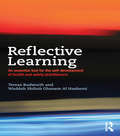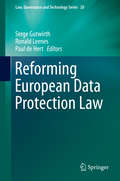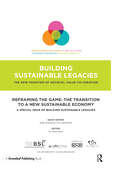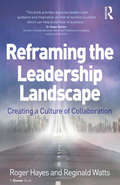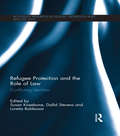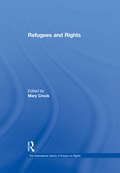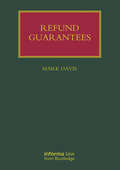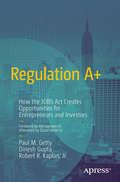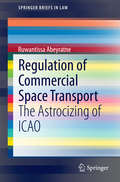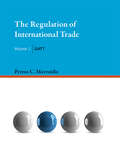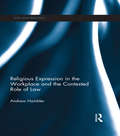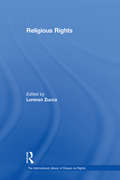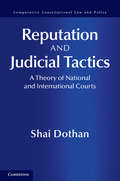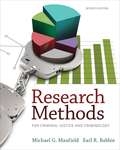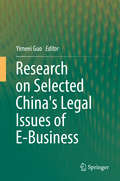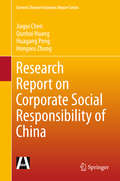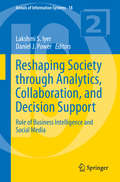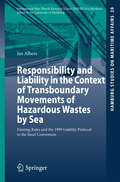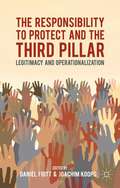- Table View
- List View
Redemptive Hope: From the Age of Enlightenment to the Age of Obama
by Akiba J. LernerThis is a book about the need for redemptive narratives to ward off despair and the dangers these same narratives create by raising expectations that are seldom fulfilled. The quasi-messianic expectations produced by the election of President Barack Obama in 2008, and their diminution, were stark reminders of an ongoing struggle between ideals and political realities. Redemptive Hope begins by tracing the tension between theistic thinkers, for whom hope is transcendental, and intellectuals, who have striven to link hopes for redemption to our intersubjective interactions with other human beings. Lerner argues that a vibrant democracy must draw on the best of both religious thought and secular liberal political philosophy. By bringing Richard Rorty’s pragmatism into conversation with early-twentieth-century Jewish thinkers, including Martin Buber and Ernst Bloch, Lerner begins the work of building bridges, while insisting on holding crucial differences in dialectical tension. Only such a dialogue, he argues, can prepare the foundations for modes of redemptive thought fit for the twenty-first century.
Reflective Learning: An essential tool for the self-development of health and safety practitioners
by Teresa Budworth Waddah Shihab Ghanem Al HashemiReflective Learning is the essential reference for health and safety practitioners wanting to develop their professional skills and practice. Whether you are a new practitioner looking to expand your knowledge or an experienced professional seeking to build on existing skills, this book is indispensable. Step by step, Reflective Learning guides you through the principles to help you to learn and improve your ability to reflect on your past experiences. The use of clear explanations, diagrams and practical tools throughout help you to improve your understanding and advance your professional development. The only book on reflective learning to focus on health and safety Written by experts in the field of health and safety A cost effective way of learning and developing for health and safety practitioners
Reforming European Data Protection Law
by Serge Gutwirth Ronald Leenes Paul De HertThis book on privacy and data protection offers readers conceptual analysis as well as thoughtful discussion of issues, practices, and solutions. It features results of the seventh annual International Conference on Computers, Privacy, and Data Protection, CPDP 2014, held in Brussels January 2014. The book first examines profiling, a persistent core issue of data protection and privacy. It covers the emergence of profiling technologies, on-line behavioral tracking, and the impact of profiling on fundamental rights and values. Next, the book looks at preventing privacy risks and harms through impact assessments. It contains discussions on the tools and methodologies for impact assessments as well as case studies. The book then goes on to cover the purported trade-off between privacy and security, ways to support privacy and data protection, and the controversial right to be forgotten, which offers individuals a means to oppose the often persistent digital memory of the web. Written during the process of the fundamental revision of the current EU data protection law by the Data Protection Package proposed by the European Commission, this interdisciplinary book presents both daring and prospective approaches. It will serve as an insightful resource for readers with an interest in privacy and data protection.
Reframing the Game: A Special Issue of Building Sustainable Legacies
by Mike Townsend Katrin MuffCapitalism is fast approaching the tipping point into a new sustainable economy that will allow people and the planet to prosper. Pieces of a jigsaw are coming together and bringing into focus a picture of a new, vibrant, attractive and sustainable economic operating system. This quiet revolution is underway - if we could only allow it to flourish.This Special Issue of Building Sustainable Legacies brings together key voices in business and academia that show us how to accelerate towards this tipping point by exploring the role that business in society, responsible education, leadership techniques and legal reform will have in shaping the new sustainable economy.Including contributions from Paul Polman, Katrin Muff, Beate Sjafjell and Gabriele Zedlmayer, this outstanding collection proposes leading insights and innovative solutions to the challenge of creating new economies that work for people and the planet.
Reframing the Leadership Landscape: Creating a Culture of Collaboration
by Roger Hayes Reginald WattsIn an uncertain and complex world leaders should not merely respond to the speed of change but attempt to anticipate it. Sometimes it is unexpected, sometimes the signs are there but the dots are not joined together. The NEW normal must be navigated, negotiated, networked and a narrative built around it. Leaders need to adapt to a changing ecosystem in which the biggest challenges cross the boundaries of the public, private and non-profit sectors, requiring much closer collaboration. Aggressive individualism is no longer a sustainable basis for companies needing to deliver social and economic value, now, enterprises must move beyond narrow self-interest and short-termism to balance stakeholder expectations. In Reframing the Leadership Landscape, Dr Roger Hayes and Dr Reginald Watts argue that the interconnected and interdependent world requires leaders to adopt a more holistic and inclusive approach. Despite global business education advances, business mostly fails to make cross-disciplinary connections or interpret weak signals and is ill-prepared for changes in cultural and technical demands. The tool kit is here, ready to be unpacked. The only question is whether aspirant leaders are sensitive enough to read the signals and develop the skills needed to create an essential collaborative paradigm, which they must do if they wish to regain trust, fill the leadership void and help reshape a sustainable future.
Refugee Protection and the Role of Law: Conflicting Identities (Routledge Research in Asylum, Migration and Refugee Law)
by Susan Kneebone Dallal Stevens Loretta BaldassarSixty years on from the signing of the Refugee Convention, forced migration and refugee movements continue to raise global concerns for hosting states and regions, for countries of origin, for humanitarian organisations on the ground, and, of course, for the refugee. This edited volume is framed around two themes which go to the core of contemporary ‘refugeehood’: protection and identity. It analyses how the issue of refugee identity is shaped by and responds to the legal regime of refugee protection in contemporary times. The book investigates the premise that there is a narrowing of protection space in many countries and many highly visible incidents of refoulement. It argues that ‘Protection’, which is a core focus of the Refugee Convention, appears to be under threat, as there are many gaps and inconsistencies in practice. Contributors to the volume, who include Erika Feller, Elspeth Guild, Hélène Lambert and Roger Zetter, look at the relevant issues from the perspective of a number of different disciplines including law, politics, sociology, and anthropology. The chapters examine the link between identity and protection as a basis for understanding how the Refugee Convention has been and is being applied in policy and practice. The situation in a number of jurisdictions and regions in Europe, North America, South East Asia, Africa and the Middle East is explored in order to ask the question does jurisprudence under the Refugee Convention need better coordination and how successful is oversight of the Convention?
Refugees and Rights: Forgotten And Invisible? (The International Library of Essays on Rights)
by Mary CrockForced migration is both as ancient as human life on earth and a relatively new subject of interest for human rights scholars. This volume continues the discussion from Migrants and Rights to focus attention on refugees, victims of trafficking and others who cross borders seeking protection from anthropogenic or natural disasters. The opening essays provide historical and conceptual overviews of rights to freedom of movement and asylum; and links between human rights and refugee law. Articles on the principle of non-refoulement in international law explore the occasional disjuncture between the individual’s right to protection and the State’s rights to protect its national interests. The refugee’s rights to due process and the substance of entitlements at law are explored in essays that range across administrative processes; social and cultural rights, including family reunion; detention; and the right of return. There follow four essays that address sexual orientation and refugee rights; refugees and disability rights; human rights and persons displaced by climate change disasters; and the rights of victims of human trafficking. The volume concludes with work reflecting on the rights discourse outside of traditional ’Western’ theatres. These cover Africa (Kenya), India, South America (Brazil) and the Asia-Pacific (Indonesia and Papua New Guinea).
Refund Guarantees (Lloyd's Shipping Law Library)
by Mark DavisA refund guarantee is an essential component of almost every shipbuilding project, without which the buyer will be unwilling or unable to proceed. There is no standard form of refund guarantee in universal usage, and both the form and substance of refund guarantee instruments vary widely from case to case. The ambiguity or uncertainty of the meaning of refund guarantee instruments, against a backdrop of a sharp downturn in the shipping markets, has led to numerous disputes in recent years concerning refund guarantees, which have been the subject of a number of important decisions of the English Courts. This is the first English law text book dedicated to the subject of refund guarantees. It provides essential guidance as to the issues arising and the pitfalls to be avoided. It analyses the specimen form of guarantee annexed to Bimco’s NEWBUILDCON form, and covers topics such as the circumstances in which the liability of the guarantor may be discharged, and when a builder may be entitled to obtain an injunction to restrain payment under a refund guarantee. It will be an essential and practical guide for those engaged in the shipbuilding industry, including shipbuilders, shipowners, banks and insurance companies, P&I clubs, and those advising them.
Regulating Lifestyle Risks
by Alberto Alemanno Amandine GardeThis collection of essays looks at the role the European Union could and should play in promoting healthier lifestyle, in light of the moral, philosophical, legal and political challenges associated with the regulation of individual choices. By tackling the main non-communicable diseases (NCD) risk factors (tobacco consumption, harmful use of alcohol, unhealthy diets and lack of physical activity), the contributors endeavour to identify common themes and determine whether and, if so, to what extent the lessons learned in relation to each area of EU intervention could be transposed to the others. By focusing on the European Union legal order, the book highlights both the opportunities that legal instruments offer for NCD prevention and control agenda in Europe, as well as the constraints that the law imposes on policy-makers.
Regulating Speech in Cyberspace
by Emily B. LaidlawPrivate companies exert considerable control over the flow of information on the internet. Whether users are finding information with a search engine, communicating on a social networking site or accessing the internet through an ISP, access to participation can be blocked, channelled, edited or personalised. Such gatekeepers are powerful forces in facilitating or hindering freedom of expression online. This is problematic for a human rights system which has historically treated human rights as a government responsibility, and this is compounded by the largely light-touch regulatory approach to the internet in the west. Regulating Speech in Cyberspace explores how these gatekeepers operate at the intersection of three fields of study: regulation (more broadly, law), corporate social responsibility and human rights. It proposes an alternative corporate governance model for speech regulation, one that acts as a template for the increasingly common use of non-state-based models of governance for human rights.
Regulation A+
by Paul M. Getty Dinesh Gupta Robert R. Kaplan"This book is a must-read for all entrepreneurs who need to raise capital to grow their businesses. " --from the Foreword by Bill Hambrecht, Founder and Chairman, WR Hambrecht + Co "We congratulate the authors for bringing together many of the elements needed to help corporations and their investors take advantage of Reg A+ in a simple and easy-to-understand guide. " --from the Afterword by David Weild IV, Founder and CEO, Weild & Co. ; Former Vice Chairman of NASDAQ; "Father" of the JOBS Act Discover how to raise money under the SEC''s long-awaited Regulation A+ implementing Title IV of the JOBS Act. This ground-breaking book is the authoritative guide to Reg A+ for executives of emerging growth companies, entrepreneurs, financial advisers, venture capitalists, investment bankers, securities lawyers, and finance and MBA students on how to raise up to $50 million a year through what is in effect a new type of IPO unencumbered by the heavy regulation and cost of a traditional IPO. Reg A+ lifts many of the constraints on soliciting funds, raising growth capital through public offerings, and trading new stock issues that till now inhibited the growth of small companies. The SEC rules implementing Title III of the JOBS Act by expanding equity crowdfunding to non-accredited investors and allowing small businesses to raise up to $1 million per year have been greeted with speculative excitement in the startup space. But investment banking and stock market heavy hitters such as Bill Hambrecht and David Weild believe that Reg A+ will have a much greater economic impact than the crowdfunding rules and will launch a revolutionary period of growth, innovation, investment returns, and job creation. Paul Getty, Dinesh Gupta, and Robert Kaplan pool their experience as serial entrepreneurs, investors, and lawyers to show readers in very practical terms how to take maximum advantage of the powerful provisions of the Reg A+ that permit companies to raise up to $50 million--a tenfold increase over the old Reg A limit of $5 million and fifty times the crowdfunding limit allow companies to market IPOs to more people than just accredited investors make it easier to get the word out on offerings exempt companies under certain conditions from onerous and costly reporting and compliance requirements, such as Sarbanes-Oxley What you''ll learn How Title IV of the JOBS Act amends Regulation A, making it easier for you to raise up to $50 million in expansion capital while avoiding burdensome regulations. How raising funds through Regulation A might now be a better and less costly choice for raising capital than current options (like loans or venture capital). How to use Regulation A to gain liquidity for your business, your employees, and your investors--while maintaining control. How to abide by Regulation A rules before, during, and after an IPO. What kinds of businesses can take part in Regulation A offerings. How and where to trade shares after the IPO. Who this book is for Executives of emerging growth companies, entrepreneurs, financial advisers, venture capitalists, investment bankers, securities lawyers, finance and MBA students, and others. Table of Contents Chapter 1 Introduction Chapter 2 Overcoming Challenges to Going Public Chapter 3 Benefits of Regulation A+ Chapter 4 Limitations and Business Line Considerations Chapter 5 The Key Elements of a Reg A+ Offering Chapter 6 Raising the Capital through an Underwriter Chapter 7 Post-IPO Activities Chapter 8 Secondary Markets and Regulation A+ Securities Chapter 9 Final Thoughts Appendix A Current Legal Authority Appendix B Current Guidance from SEC Appendix C Public Statements of Commissioners at Open Meeting to Adopt Regulation A+ Appendix D OTC QX/OTC QB Listing Requirements and On-Ramp Guides Appendix E Offering Statement Exemplars Appendix F: Blue Sky Glossary
Regulation of Commercial Space Transport
by Ruwantissa AbeyratneThis book provides a look at the various nuances of the commercial aspects of space transport and offers a workable and practical legal and regulatory approach to be taken by the International Civil Aviation Organization. The book also addresses the perceived lack of wisdom in neglecting to consider the basic legal structure of a regulatory regime for commercial space transport as a first step and goes on to analyze ways and means of using the existing legal instruments pertaining to international civil aviation as an analogous system that can be moulded into a separate and cohesive set of multilateral legal instruments that could apply to commercial space transport. As expected, commercial space transport has taken off with a flourish. It is now evident that, from sub-orbital flights to mining asteroids, this industry will grow exponentially. Signs of its importance are reflected by various international conferences being convened on the subject both by academia and the international community. The only snag is the lack of a regulatory instrument or in the least a contrived approach to a definitive legal regime that would provide a structure, purpose and direction to commercial space transport. This blatant lacuna and neglect has resulted in the emergence of various theories by academics and a half hearted look at the subject by the international legal community.
The Regulation of International Trade, Volume 1: GATT
by Petros C. MavroidisA detailed examination of the GATT regime for international trade, discussing the negotiating record, policy background, economic rationale, and case law. The General Agreement on Tariffs and Trade (GATT) was created alongside other towering achievements of the post-World War II era, including the United Nations, the World Bank, and the International Monetary Fund. GATT, the first successful agreement to generate multilateral trade liberalization, became the principal institution to administer international trade for the next six decades. In this book, Petros Mavoidis offers detailed examination of the GATT regime for international trade, discussing the negotiating record, policy background, economic rationale, and case law. Mavroidis offers a substantive first chapter that provides a detailed historical background to GATT that stretches from the 1927 World Economic Conference through Bretton Woods and the Atlantic Charter. Each of the following chapters examines the disciplines agreed to, their negotiating record, their economic rationale, and subsequent practice. Mavroidis focuses on cases that have influenced the prevailing understanding of the norm, as well as on literature that has contributed to its interpretation, and the final outcome. In particular, he examines quantitative restrictions and tariffs; the most favored nation clause (MFN), the cornerstone of the GATT edifice; preferential trade agreements and special treatment for products originating in developing countries; domestic instruments; and exceptions to the obligations assumed under GATT. This book's companion volume examines World Trade Organization (WTO) agreements regulating trade in goods.
Religious Expression in the Workplace and the Contested Role of Law (Law and Religion)
by Andrew HamblerThe workplace is a key forum in which the issue of religion and its position in the public sphere is under debate. Desires to observe and express religious beliefs in the workplace can introduce conflict between employees and employers. This book addresses the role the law plays in the resolution of these potential conflicts. The book considers the definition and underlying motives of religious expression, and explores the different ways it may impact the workplace. Andrew Hambler identifies principled responses to workplace religious expression within a liberal state and compares this to the law applying in England and Wales and its interpretation by courts and tribunals. The book determines the extent to which freedom of religious expression for the individual enjoys legal protection in the workplace in England and Wales, and asks whether there is a case for changing the law to strengthen that protection. The book will be of great use and interest to scholars and students of religion and the law, employment law, and religion and human rights.
Religious Rights (The International Library of Essays on Rights)
by Lorenzo ZuccaThe central focus of this collection of essays is the role and place of freedom of religion in the protection and promotion of world order. The volume offers competing models of world order from a global perspective and highlights the lack of consensus and considerable variety of practice and belief around the globe as to the definition of religious freedom and where and whether freedom of religion is regarded as the first freedom in the world. The leading theories of freedom of religion are discussed and provide an understanding of freedom of religion beyond the nation state. The liberal view at the global level is also examined and observations are included regarding the need to rethink secularism in the light of present circumstances and within the global context.
Renewing Moral Theology: Christian Ethics as Action, Character and Grace
by Daniel A. WestbergWhile ethical issues are being raised with new urgency, Christians are increasingly unfamiliar with the moral grammar of their faith. The need to reengage the deep-down things of the Christian moral tradition has seldom been more urgent. Moral theology has a long history in the Catholic and Anglican traditions. The tradition of theological ethics, influenced by Aristotle by way of Aquinas, offers a distinct emphasis on the virtues and character formation. Now Daniel Westberg infuses this venerable ethical tradition with a biblical confidence in the centrality of the gospel and the role of the Holy Spirit in forming character, while also laying down a sound moral psychology for practical reason and ethical living. Christians—whether of Anglican, Catholic or of other traditions—interested in vigorously retrieving a great moral heritage, will find here common ground for ethical reflection and discipleship.
Reputation and Judicial Tactics
by Shai DothanThis book argues that national and international courts seek to enhance their reputations through the strategic exercise of judicial power. Courts often cannot enforce their judgments and must rely on reputational sanctions to ensure compliance. One way to do this is for courts to improve their reputation for generating compliance with their judgments. When the court's reputation is increased, parties will be expected to comply with its judgments and the reputational sanction on a party that fails to comply will be higher. This strategy allows national and international courts, which cannot enforce their judgments against states and executives, to improve the likelihood that their judgments will be complied with over time. This book describes the judicial tactics that courts use to shape their judgments in ways that maximize their reputational gains.
Research Methods for Criminal Justice and Criminology 7th Edition
by Michael G. Maxfield Earl R. BabbieProviding an introduction to criminal justice research and enhanced by examples, research, applications, and built-in study tools, this book focuses on helping readers to do research.
Research on Selected China's Legal Issues of E-Business
by Yimeei GuoThis book focuses on various problems arising as a result of China's e-business development. These include e-commerce aspects of the internet industry and e-governance aspects of the presiding agencies. E-privacy and online IPR protection will be of particular interest to readers, as these are important international problems that China has been trying its best to deal with for many years. Each paper in this book presents valuable guidelines and suggestions to allow readers to form a sound understanding of China's e-business development.
Research Report on Corporate Social Responsibility of China
by Jiagui Chen Qunhui Huang Huagang Peng Hongwu ZhongThis book is compiled based on the research methodology and technical approach applied in the Blue Book of Corporate Social Responsibility. It consists of five parts: Summary, index, Industry, Case Studies, and Appendices. The index evaluates Chinese enterprises annually on their performance in CSR management and the level of information disclosure by assessing four different aspects: responsibility management, economic responsibilities, social responsibilities and environmental responsibilities. Moreover, it identifies and analyzes phase-specific characteristics of CSR development in China in the hope of providing references for further studies on Chinese CSR.
Reshaping Markets
by Lomfeld, Bertram and Somma, Alessandro and Zumbansen, Peer Bertram Lomfeld Alessandro Somma Peer ZumbansenSet against the origins and consequences of the global financial crisis, this timely book offers an enriching and revealing narrative of the role that the state plays in regulating markets. Focusing on core areas of private law such as corporate, labour and banking law, the contributors offer a conceptual framework in which to examine the central tenets of the role of private law in today's global economy. In the current climate of ever increasing economic inequality and austerity measures, the authors highlight the urgent need for a comprehensive analysis of the continuing tension between ideas of market liberalism and theories of society. With a focus on both the domestic and transnational dimensions of market governance, the authors offer a crucial insight into the co-existence and interaction between state and market-based economic governance.
Reshaping Society through Analytics, Collaboration, and Decision Support
by Lakshmi S. Iyer Daniel J. PowerThis volume explores emerging research and pedagogy in analytics, collaboration, and decision support with an emphasis on business intelligence and social media. In general, the chapters help understand where technology involvement in human decisions is headed. Reading the chapters can help understand the opportunities and threats associated with the use of information technology in decision making. Computing and information technologies are reshaping our global society, but they can potentially reshape it in negative as well as positive ways. Analytics, collaboration and computerized decision support are powerful decision aiding and decision making tools that have enormous potential to impact crisis decision making, regulation of financial systems, healthcare decision making and many more important decision domains. Many information technologies can potentially support, assist and even decide for human decision makers. Despite the potential, some researchers think that we know the answers to how these technologies will change society. The "Wisdom of Crowds" or "Big Data" become the topic of the day and are soon replaced with new marketing terms. In many ways, mobile technology is just another form factor to adapt decision support capabilities too and experiment with new capabilities. The cloud is a nebulous metaphor that adds to the mystery of information technology. Wireless technology enables the ubiquitous presence of analytics and decision support. With new networking capabilities, collaboration is possible anywhere and everywhere using voice, video and text. Documents can be widely shared and massive numbers of documents can be carried on a small tablet computer. Recent developments in technologies impact the processes organizations use to make decisions. In addition, academics are looking for ways to enhance their pedagogy to train students to be more adept in understanding how emerging technology will be used effectively for decision making in organizations. The chapters are based on papers originally reviewed at the Special Interest Group on Decision Support Systems (SIGDSS) Workshop at the 2013 International Conference on Information Systems (ICIS 2013). Ultimately this volume endeavors to find a balance between systematizing what we know, so we can teach our findings from prior research better, and stimulating excitement to move the field in new directions.
Resistance and Change in the International Law on Foreign Investment
by M. SornarajahSince the 1990s, conflicts within international law on foreign investment have arisen as a result of several competing interests. The neoliberal philosophy ensured inflexible investment protection given by a network of investment treaties interpreted in an expansive manner, which led to states creating regulatory space over foreign investment. However, NGOs committed to single causes such as human rights and the environment protested against inflexible investment protection. The rise to prominence of arguments against the fragmentation of international law also affected the development of investment law as an autonomous regime. These factors have resulted in some states renouncing the system of arbitration and other states creating new treaties which undermine inflexible investment protection. The treaty-based system of investment protection has therefore become tenuous, and change has become inevitable. Emphasising the changes resulting from resistance to a system based on neoliberal foundations, this study looks at recent developments in the area.
Responsibility and Liability in the Context of Transboundary Movements of Hazardous Wastes by Sea
by Jan AlbersThe term "hazardous wastes" covers a wide range of disused products and production wastes generated not only in industrial sectors, but also in all areas of everyday life. Hazardous wastes are to a large extent shipped by sea to third countries for recycling or disposal. While the procedural requirements for such movements are laid out in the 1989 Basel Convention, explicit rules of responsibility and liability for resulting damages are neither provided by the Basel Convention nor by other international conventions. The Liability Protocol to the Basel Convention of 1999 has not yet entered into force. This book examines the existing rules of responsibility and liability applying to States and private persons and outlines the conditions under which liability may be incurred. Subsequently, the advantages and shortcomings of the 1999 Liability Protocol are analyzed. Although this Protocol faces substantial political headwind, from a legal perspective it includes principally useful and reasonable approaches and should therefore be ratified.
The Responsibility to Protect and the Third Pillar
by Daniel Fiott Joachim KoopsAs the RtoP moves from norm to operationalization, greater analysis of action to halt crimes against humanity, war crimes, genocide and ethnic cleansing is needed. This uncovers opportunities and challenges associated with third pillar interventions by looking at legal, economic, political, military and alternative interventions in third-countries.

